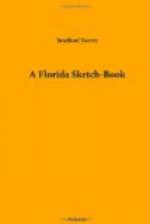The Murat house, certainly, was never a palace, except as love may have made it so. But it was old; people had lived in it, and died in it; those who once owned it, whose name and memory still clung to it, were now in narrower houses; and it was easy for the visitor—for one visitor, at least—to fall into pensive meditation. I strolled about the grounds; stood between the last year’s cotton-rows, while a Carolina wren poured out his soul from an oleander bush near by; admired the confidence of a pair of shrikes, who had made a nest in a honeysuckle vine in the front yard; listened to the sweet music of mocking-birds, cardinals, and orchard orioles; watched the martins circling above the trees; thought of the Princess, and smiled at the black children who thrust their heads out of the windows of her “big house;” and then, with a sprig of honeysuckle for a keepsake, I started slowly homeward.
The sun by this time was straight overhead, but my umbrella saved me from absolute discomfort, while birds furnished here and there an agreeable diversion. I recall in particular some white-crowned sparrows, the first ones I had seen in Florida. At a bend in the road opposite the water-lily swamp, while I was cooling myself in the shade of a friendly pine-tree,—enjoying at the same time a fence overrun with Cherokee roses,—a man and his little boy came along in a wagon. The man seemed really disappointed when I told him that I was going into town, instead of coming from it. It was pretty warm weather for walking, and he had meant to offer me a lift. He was a Scandinavian, who had been for some years in Florida. He owned a good farm not far from the Murat estate, which latter he had been urged to buy; but he thought a man wasn’t any better off for owning too much land. He talked of his crops, his children, the climate, and so on, all in a cheerful strain, pleasant to hear. If the pessimists are right,—which may I be kept from believing,—the optimists are certainly more comfortable to live with, though it be only for ten minutes under a roadside shade-tree.
When I reached the street-car track at the foot of the hill, the one car which plies back and forth through the city was in its place, with the driver beside it, but no mules.
“Are you going to start directly?” I asked.
“Yes, sah,” he answered; and then, looking toward the stable, he shouted in a peremptory voice, “Do about, there! Do about!”
“What does that mean?” said I. “Hurry up?”
“Yes, sah, that’s it. ’Tain’t everybody that wants to be hurried up; so we tells ’em, ‘Do about!’”
Half a minute afterwards two very neatly dressed little colored boys stepped upon the rear platform.
“Where you goin’?” said the driver. “Uptown?”
They said they were.
“Well, come inside. Stay out there, and you’ll git hurt and cost this dried-up company more money than you’s wuth.”




